Here I stand on the banks of the river stupid pointing out the atrocious things that make me shake my head in shock, but this is primarily a Supernatural, Destiel, Fanfiction, and Fanart blog. I go by stkirsch on Ao3 and FrescaFish on deviant art. I like to showcase artists and writers plus any other random shit that tickles my fancy.
Don't wanna be here? Send us removal request.
Text
This was posted on a ‘second hand finds’ Facebook page…
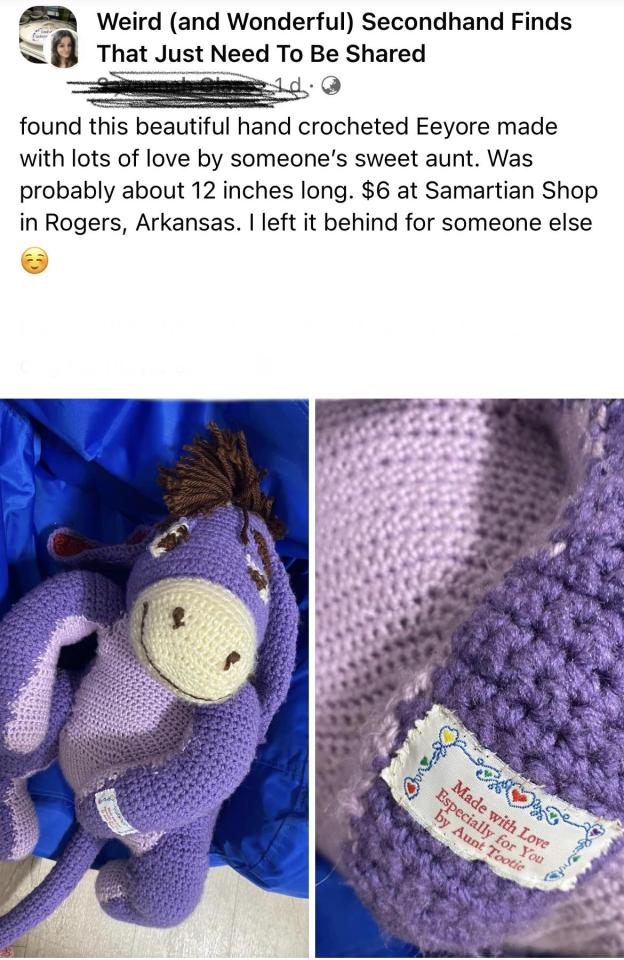
…only to be followed by this amazing message.
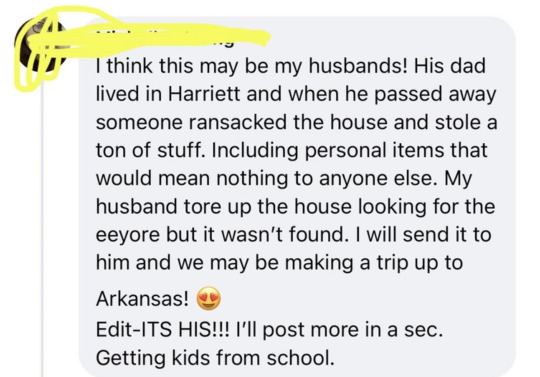
The roller coaster ride started.


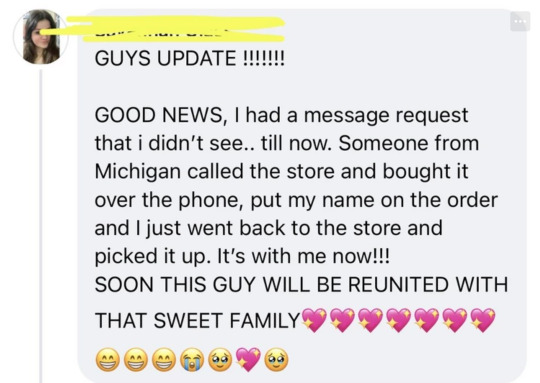
With a happy ending…
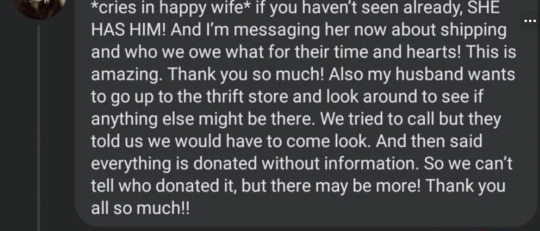
…and a sweet poem to finish.
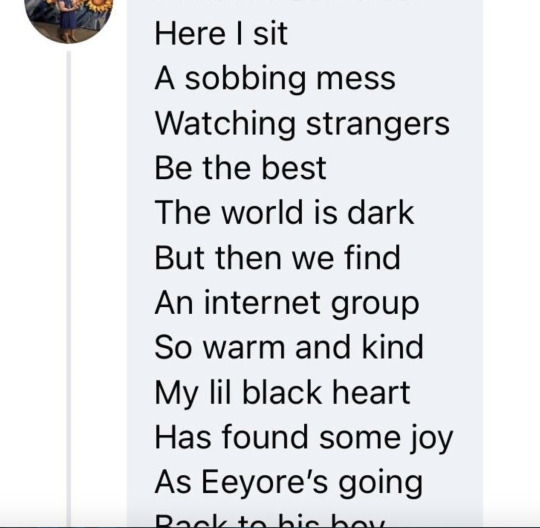
59K notes
·
View notes
Text
@pimentogirl thank you so much for reblogging this. I've read most of these but could never remember them to find them!
Love how tumblr has its own folk stories. Yeah the God of Arepo we’ve all heard the story and we all still cry about it. Yeah that one about the woman locked up for centuries finally getting free. That one about the witch who would marry anyone who could get her house key from her cat and it’s revealed she IS the cat after the narrator befriends the cat.
356K notes
·
View notes
Video
Stop motion of Jason Voorhees and Michael Myers in a candy factory
7K notes
·
View notes
Text
Gonna have to send this to my sister in honor of her departed Xara Pantera.




97 notes
·
View notes
Text
Yesterday was a bad writing day. I spent a lot of time staring at a screen. Lots of Tumblr replies. Lots of Twitter (the Netflix Sandman trailer going out didn’t help). Lots of being grumpy at myself and convinced I couldn’t do it any more. The script was a mess. I was doomed. This morning I printed out what I had to fix, picked up a pen, made a few notes and started typing. It was fun and easy and straightforward. I finished it and sent it to the people who needed to see it, and just got an amazed call from our script editor saying she was laughing while crying and couldn’t work out how I’d done everything in a day.
And I hadn’t done it all in a day. All of the being miserable yesterday was necessary for it to fly today. All of the knowing it was insoluble and awful made the work today relatively easy. I had to get out of my own way, and had to read it freshly, without being attached to anything. And then I just did the notes. And to make the thing that worked today, a lot of stuff that didn’t quite work or sort of worked had to be written too. It’s always easier to fix stuff that exists.
Anyway. Yesterday = bad writing day. Today = good writing day. I thought it was worth telling people, in case there was anyone else out there who was having a bad writing day too.
42K notes
·
View notes
Photo






Would love to make some Halloween-themed pet portraits this year!! (Haven’t done them in a while now)
Email: reimenayee@gmail(dot)com
477 notes
·
View notes
Text
Why none of my books are available on Audible (and why Amazon owes me $3,218.55)

I love audiobooks. When I was a high-school-aged page at a public library in the 1980s, I would pass endless hours shelving and repairing books while listening to “books on tape” from the library’s collection. By the time iTunes came along, I’d amassed a huge collection of cassette and CD audiobooks and I painstakingly ripped them to my collection.
Then came Audible, and I was in heaven — all the audiobooks, none of the hassle of ripping CDs. There was only one problem: the Digital Rights Management (DRM). You see, I’ve spent most of my adult life campaigning against DRM, because I think it’s an existential danger to all computer users — and because it’s a way for tech companies to hijack the relationship between creators and their audiences.
In 2011, I gave a speech at Berlin’s Chaos Communications Congress called “The Coming War on General Purpose Computing.” In it, I explained that Digital Rights Management was technologically incoherent, a bizarre fantasy in which untrusted users of computers could be given encrypted files and all the tools needed to decrypt them, but somehow be prevented from using those decrypted files in ways that conflicted with the preferences of the company that supplied those files.
As I said then, computers are stubbornly, inescapably “general purpose.” The only computer we know how to make — the Turing-complete von Neumann machine — is the computer that can run all the programs we know how to write. When someone claims to have built a computer-powered “appliance” — say, a smart speaker or (God help us all) a smart toaster — that can only run certain programs, what they mean is that they’ve designed a computer that can run every program, but which will refuse to run programs unless the manufacturer approves them.
But this is also technological nonsense. The program that checks to see whether other programs are approved by the manufacturer is also running on an untrusted adversary’s computer (with DRM, you are the manufacturer’s untrusted adversary). Because that overseer program is running on a computer you own, you can replace it, alter it, or subvert it, allowing you to run programs that the manufacturer doesn’t like. That would include (for example) a modified DRM program that unscrambles the manufacturer-supplied video, audio or text file and then, rather than throwing away the unscrambled copy when you’re done with it, saves it so you can open it with a program that doesn’t restrict you from sharing it.
As a technical matter, DRM can’t work. Once one person figures out how to patch a DRM program so that it saves the files it descrambles, they can share that knowledge (or a program they’ve written based on that knowledge) with everyone in the world, instantaneously, at the push of a button. Anyone who has that new program can save unscrambled copies of the files they’ve bought and share those, too.
DRM vendors hand-wave this away, saying things like “this just keeps honest users honest.” As Ed Felten once said, “Keeping honest users honest is like keeping tall users tall.”
In reality, DRM vendors know that technical countermeasures aren’t the bulwark against unauthorized reproduction of their files. They aren’t technology companies at all — they’re legal companies.
In 1998, Bill Clinton signed the Digital Millennium Copyright Act (DMCA) into law. This is a complex law and a decidedly mixed bag, but of all the impacts that the DMCA’s many clauses have had on the world, none have been so quietly, profoundly terrible as Section 1201, the “anti-circumvention” clause that protects DRM.
Under DMCA 1201, it is a felony to “traffick” in tools that bypass DRM. Doing so can land you in prison for five years and hit you with a fine of up to $500,000 (for a first offense). This clause is so broadly written that merely passing on factual information about bugs in a system with DRM can put you in hot water.
Here’s where we get to the existential risk to all computer users part. As a technology, DRM has to run as code that is beyond your observation and control. If there’s a program running on your computer or phone called “DRM” you can delete it, or go into your process manager and force-quit it. No one wants DRM. No one woke up this morning and said, “Dammit, I wish there was a way I could do less with the entertainment files I buy online.” DRM has to hide itself from you, or the first time it gets in your way, you’ll get rid of it.
The proliferation of DRM means that all the commercial operating systems now have a way to run programs that the owners of computers can’t observe or control. Anything that a technologist does to weaken that sneaky, hidden facility risks DMCA 1201 prosecution — and half a decade in prison.
That means that every device with DRM is designed to run programs you can’t see or kill, and no one is allowed to investigate these devices and warn you if they have defects that would allow malicious software to run in that deliberately obscured part of your computer, stealing your data and covertly operating your device’s sensors and actuators. This isn’t just about hacking your camera and microphone: remember, every computerized “appliance” is capable of running every program, which means that your car’s steering and brakes are at risk from malicious software, as are your medical implants and the smart thermostat in your home.
A device that is designed for sneaky code execution and is legally off-limits to independent auditing is bad. A world of those devices — devices we put inside our bodies and put our bodies inside of — is fucking terrifying.
DRM is bad news for our technological future, but it’s also terrible news for our commercial future. Because DMCA 1201 bans trafficking in circumvention devices under any circumstances, manufacturers who design their products with a thin skin of DRM around them can make using those products in the ways you prefer into a literal crime — what Jay Freeman calls “felony contempt of business model.”
The most obvious example of this is in the Right to Repair fight. Devices from tractors and cars to insulin pumps, wheelchairs and ventilators have been redesigned to use DRM to detect and block independent repair, even when the technician uses the manufacturer’s own parts. These devices are booby-trapped so that any “tampering” requires a new authorization code from the manufacturer, which is only given to the manufacturer’s own service technicians.
This allows manufacturers to gouge you on repair and parts, or to simply declare your device to be beyond repair and sell you a new one. Global, monopolistic corporations are drowning the planet in e-waste as a side-effect of their desire to block refurbished devices and parts from cutting into their sales of replacements:.
DRM laws like DMCA 1201 are now all over the world, spread by the US Trade Representative, who made DRM laws a condition of trading with the USA, and a feature of the WTO agreement. Whether you’re in South America, Australia, Europe, Canada, Japan, or even China, DRM-breaking tools are illegal. But remember: DRM is a technological fool’s errand. So while there is no above-ground, legal market for DRM-breaking tools, there is still a thriving underground for them.
For example, farmers all over the world replace the software on their John Deere tractors with software of rumored Ukrainian origin that floats around on the internet. This software lets them fix their tractors without having to wait days for a $200 visit from a John Deere technician, but no one knows what’s in the software, or who made it, or whether it has sneaky back-doors or other malicious code.
And yet, manufacturers keep putting DRM in their products. The prospect of making it a felony to displease your corporate shareholders is just too much to resist.
Which brings me back to Audible. Back before Amazon owned Audible, I bought thousands of dollars’ worth of Audible audiobooks, and they worked great — but they failed badly. When I switched operating systems and could no longer get an Audible playback program, I was in danger of losing my audibook investment. In the end, I had to rig up three old computers to play my Audible audiobooks out in real time and recapture them as plain old MP3s. It took weeks. If I’d made the switch a couple years later, it would have been months (the “audiobooks” folder on my current system has 281 days’ worth of audio!).
Amazon bought Audible during a brief interval in which the company was taking on DRM. They had just launched the Amazon MP3 store, as a rival to Apple’s iTunes Store, which sold music without DRM, so users wouldn’t be locked to Apple’s platform. This was a problem the music industry had just woken up to, after years of demanding DRM, they realized that nearly all the digital music they’d ever sold was locked to Apple’s platform, and that meant that Apple got to decide whether and how their catalog was sold.
Amazon’s MP3 store’s slogan was “DRM: Don’t Restrict Me.” They even sent me a free t-shirt to promote the launch, because they knew my feelings on DRM.
When Amazon announced its Audible acquisition, they promised that they would remove DRM from the Audible store, and I rejoiced. Then, after the acquisition…nothing. Not a word about DRM. The Amazon PR people who’d once enthusiastically pitched me on Amazon’s DRM-free virtue stopped answering my email.
When I got new PR pitches from Amazon, I’d reply by asking about DRM and I’d never hear from those PR people again. I got invited to give a talk at Amazon and I said sure, I’d do it for free — but I wanted to talk to someone from Audible about DRM. The invitation was rescinded.
Once on a book-tour, I gave a talk at Goodreads — another Amazon division — about my work and when they asked if I had any questions for them, I raised Audible’s DRM and the senior managers in the audience promised to look into it. I never heard from them again.
Today, Audible dominates the audiobook market. In some verticals, their market-share is over 90 percent! And Audible will not let authors or publishers opt out of DRM. If you want to publish an audiobook with Audible, you must let them add their DRM to it. That means that every time one of your readers buys one of your books, they’re locking themselves further into Audible. If you sell a million bucks’ worth of audiobooks on Audible, that’s a million bucks your readers have to forfeit to follow you to a rival platform.
As a rightsholder, I can’t authorize my users to strip off Audible’s DRM and switch to a competitor. I can’t even find out which of my readers bought my books from Audible and send them a download code for a free MP3. Even when I invest tens of thousands of dollars of my own money to hire professional narrators to record my audiobooks, if I sell them on Audible, they get the final say in how my readers use the product I paid to create. If I provide my readers with a tool to unwrap Audible’s DRM from my copyrighted books, I become a copyright infringer! I violate Section 1201 of the DMCA and I can go to prison for five years and face a $500,000 fine. For a first offense.
All of this is so glaringly terrible that it prompted me to coin Doctorow’s First Law:
“Any time someone puts a lock on something that belongs to you, but won’t give you the key, that lock is not there for your benefit.”
It’s been more than a decade since Amazon bought Audible and it’s clear that their DRM policy isn’t going anywhere.
Which is why none of my audiobooks are available on Audible.
I don’t want to contribute to the DRM-ification of our devices, turning them into a vast, unauditable attack-surface that is designed to run programs that we can’t see or terminate. I don’t want my work to be a lure into a DRM-poisoned platform. I don’t want to make myself beholden to Amazon, locking my customers to its platform with every sale.
This doesn’t mean I don’t have audiobooks — I do! Early on, I worked with great audiobook publishers like Random House and Blackstone and Macmillan to produce DRM-free audiobooks which were sold everywhere except Audible. But Audible has the vast majority of the market, and it just didn’t make financial sense for these publishers to pay me a decent sum for my audio rights and then pay great narrators and engineers to produce books.
So I started retaining my audio rights in my book deals, and paying to record my own audiobooks. The first one was Information Doesn’t Want to Be Free, recorded by @wilwheaton, with introductions by @neil-gaiman and Amanda Palmer, which explains Doctorow’s First Law in detail.
Since then, I’ve produced many more independent audiobooks, including the audio for Homeland (the bestselling sequel to my YA novel Little Brother, also narrated by Wil), Walkaway (a fabulous multi-cast audiobook starring Amber Benson, Wil Wheaton, Amanda Palmer, Miron Willis, Gabrielle de Cuir and others), and Attack Surface (the third Little Brother book, narrated by Amber Benson).
Generally, these books recoup and make a little money besides, but not nearly so much as I’d make if I sold through Audible. My agent tells me that if I’d been willing to set aside my ethics and allow Audible to slap DRM on my books, I’d have made enough money to pay off my mortgage and save enough to pay for my kid’s entire college education.
That’s a price I’m willing to pay. In the years since the Amazon acquisition, Audible has become the 800-pound gorilla of audiobooks. They have done all kinds of underhanded things — like buying up the first couple books in a series and releasing them as Audible-only recordings, then refusing to record the rest of the series, orphaning it. They’re also notorious among narrators for squeezing their hourly rates lower than anyone else. Audible also refuses to sell into libraries, so all the “Audible Original” titles are blocked from our public library systems.
I think audiences get that there’s something really wrong with a system where a single company controls an entire literary format. In 2020, I Kickstarted the independent audiobook of Attack Surface and broke every record for audiobook crowdfunding, raising $276,000.
But Audible continues to dominate. It is the only digital audiobook channel Amazon will allow, so anyone who searches Amazon for a book will only see the Audible audio edition. It’s also the exclusive audio partner for Apple’s iTunes/Apple Books channel, which is the only iOS audiobook store that doesn’t have to pay Apple a 30 percent commission on all its sales, so it’s the only audiobook store that lets you actually buy new audiobooks.
Other audiobook stores require you to buy your books with a web-browser (which avoids Apple’s sky-high commissions) and then switch back to the app to download them — a clunky experience that has ensured that Apple’s own audiobook channel — with its mandatory DRM — is the only one iOS customers really use.
Not surprisingly, a lot of people assume that if an Audible search for an author or book comes up empty, that means there is no audiobook available. They don’t think of searching for the book on Google Books, or Libro.fm, or Downpour. They never think to check to see whether the author maintains their own storefront, as I do, where you can get all their ebooks and audiobooks without DRM.
That’s bad enough, but it gets worse. So much worse.
Audible has a side-hustle called ACX: it’s a “self-serve” platform where writers and narrators can team up to self-produce their own audiobooks, which are locked to Audible’s platform and encumbered with Audible’s DRM.
ACX has some nominal checks to ensure that the audiobooks that land on its platform are duly licensed from the rightsholders, but these are trivial to circumvent. Here’s how I know that: on multiple occasions, I’ve discovered that my own books have been turned into unauthorized audiobooks over ACX.
Scammers claiming to have the rights to my books commission narrators to record them on the cheap, with the promise of a royalty split when they are live. Inexperienced narrators, excited at the prospect of recording a major book by a bestselling author, put long, grueling hours into recording them. Then the book goes live, and I discover it, and have it taken down. The scammer disappears with the profits from the sales in the interim, and the narrator is screwed.
As am I.
Because these illegal ACX audiobooks compete with my own, self-produced editions, for which I pay narrators, directors and editors a fair wage for their creative labor. These unauthorized ACX audiobooks show up in searches for my name on Audible and Amazon, where my own (vastly superior, authorized) DRM-free audiobooks are not allowed.
This isn’t an isolated incident. It’s happened over and over again. It just happened again.
Last week, I heard from Shawn Hartel, a narrator who got scammed on ACX by someone calling themself “Barbara M. Rushing,” who told Hartel that they held the audio rights to my 2017 novel Walkaway. They do not have those rights.
I spent about $50,000 recording a stupendous audiobook edition of Walkaway, which you can buy here for $24.95.
This audiobook has met with widespread critical acclaim and the print edition has been translated and celebrated around the world. But Hartel didn’t know that.
On January 11, 2021, he accepted an offer from “Barbara M. Rushing” to record the book and worked long hours to produce a 16-hour narration. On February 1, 2021, the book was accepted by Rushing. On July 7, 2021, ACX listed Walkaway for sale. On November 9, 2021, ACX took the book down, having figured out that it was infringing.
In the meantime, Rushing sold 119 copies and gave away ten more, diverting people from buying my own, DRM-free edition.
129 times $24.95 is $3,218.55, and as far as I’m concerned, that’s what Amazon owes me.
Now, I’m not going to sue them (probably). I don’t have the money or time to fight that kind of battle. For one thing, I have eight books (four novels, a YA graphic novel, a short story collection and two nonfiction books) in various stages of production right now, and I’m going to be producing my own audio editions for them, which is going to suck up a lot of time.
But Amazon does owe me $3,218.55.
I don’t expect they’ll pay it.
Anyone who’s paid attention to Audiblegate knows about Amazon’s dirty ACX dealing. The company has been credibly accused of more than $100 million in wage-theft from ACX authors and narrators, whom it has scammed with a combination of a one-sided refunds policy and out-and-out accounting fraud.
I know a lot about Audiblegate because there’s a whole chapter about it in Chokepoint Capitalism: How Big Tech and Big Content Captured Creative Labor Markets and How We’ll Win Them Back, the book on creative labor markets that Rebecca Giblin and I wrote for Beacon Press:
Chokepoint Capitalism explains how large media and tech companies have cornered the markets for creative labor, and why giving creators more copyright won’t unrig this rigged game. The tech and entertainment giants are like bullies at the school gate who shake down creators for their lunch money every day.
To reach your audience you have to go through the chokepoints they have erected, and when you do, any additional copyright powers Congress has granted you is taken away as a condition of entry (think of how Audible nonconsensually takes away your right to use DRM law if you want to list your audiobooks).
If you give your bullied kid more lunch money, you won’t buy them lunch — you’ll just make the bullies at the school-gate richer. Giving creators more copyright inevitably results in those copyrights being transferred to Amazon and other monopolists. To get lunch for your kid — or justice for creators — you have to get rid of the chokepoints.
That’s what Chokepoint Capitalism is really about — not just how the markets got rigged, but how to fix them, with a list of shovel-ready, practical actions for local governments, national legislatures, artists’ groups, as well as creators, technologists and audiences.
We’re going to be rolling out a crowdfunding campaign for the Chokepoint Capitalism audiobook in a couple of weeks (the book comes out in mid-September). We’ve scored an incredible narrator, Stefans Rudnicki, who you may have heard on the Ender’s Game books, Hubris by Michael Isikoff and David Corn, or any of 1,000 other audiobooks. Stefan’s won a Stoker, a Bradbury, dozens of Audies and Earphones, two Grammys, and two Hugos. It’s gonna be fucking great.
And it won’t be available on Audible. Who owe me $3,218.55.
But you know what will*be available on Audible?
This. This essay, which I am about to record as an audiobook, to be mastered by my brilliant sound engineer John Taylor Williams, and will thereafter upload to ACX as a self-published, free audiobook.
Perhaps you aren’t reading these words off your screen. Perhaps you are an Audible customer who searched for my books and only found this odd, short audiobook entitled: “Why none of my books are available on Audible: And why Amazon owes me $3,218.55.”
I send you greetings, fellow audiobook listener!
I invite you to buy all my audiobooks at prices lower than Amazon’s, free from DRM and unencumbered by comedy-of-the-absurd “user agreements” that no one in their right mind would ever*agree to. They are for sale at craphound.com/shop.
Among those audiobooks, the $15 edition of Information Doesn’t Want to Be Free, where I explain not just Doctorow’s First Law, but also my Second and Third Laws (my agent was Arthur C. Clarke’s agent; when I told him I had come up with “Doctorow’s Law,” he told me that I needed three laws). As noted, this is superbly read by Wil Wheaton, and Neil Gaiman and Amanda Palmer read their own intros:
Of course, you will only find this book if Amazon ACX accepts it. I’ve combed quite carefully through their terms of service and I don’t see anything that would disqualify this from being listed as an ACX book.
But then again, they say they ban books produced without permission from the copyright holder and we’ve seen how that works out, right? From poking around on ACX, it looks like Amazon’s main way of checking whether a user has the rights to a book is by looking in Amazon’s catalog to see if there’s already an audiobook edition. That means that if a writer refuses to sell on Audible because of their DRM policies, Audible will use that boycott as an excuse to let ripoff artists bilk the writer, the narrator and the listeners — because if there’s no Audible edition, they assume that the audio rights must be up for grabs.
Will Audible let me use its platform to give away a book that criticizes Audible? Or will they exercise their overwhelming market power to both abet a $3,218.55 ripoff and suppress a critique of their role in that ripoff?
Only time will tell.
#

[Image ID: A screengrab of the ACX page for the audiobook, showing that it is ‘pending audio review]
Addendum: I wrote the above on July 4, 2022, just before submitting the audiobook to Amazon and leaving for a holiday. Over the past two weeks, I’ve checked in with ACX daily, but the audiobook still shows as “Pending Audio Review.” ACX advises that this process should take a maximum of ten business days. It’s been 15. Perhaps they’re very backlogged.
Or maybe they’re hoping that if they delay the process long enough, I’ll give up. In the meantime, there is now a Kindle edition of this text:
https://www.amazon.com/dp/B0B5RWTPR7/
I had to put this up, it’s a prerequisite for posting the audio to ACX. I hadn’t planned on posting it, but since they made me, I did.

[Image ID: A screengrab of the Kindle listing page for my ebook showing it as the number one new release in antitrust.]
Bizarrely, this is currently the number one new Amazon book on Antitrust Law!
Also bizarrely - given the context - this book was taken down for several days due to a spurious copyright issue over the cover art, a cack-handed collage of some Creative Commons icons I put together with The GIMP. Amazon flagged this as a copyright violation (despite correct Creative Commons attribution) and took the book down, demanding that I change the cover art, ignoring my explanations. I was ultimately able to get the book restored by contacting someone I know at Amazon legal, who intervened.
I don’t know if Amazon will ever release my audiobook, but I hope they do. In the meantime, you can listen to the audiobook of this essay for free via my podcast:
https://archive.org/download/Cory_Doctorow_Podcast_431/Cory_Doctorow_Podcast_431_-_Why_none_of_my_books_are_available_on_Audible.mp3
Image: Paris 16 (modified)/CC BY-SA 4.0; Dmitry Baranovskiy (modified) CC BY 4.0
[Image ID: An anti-pickpocketing graphic featuring a stick figure reaching into an adjacent stick-figure’s shoulder-bag. The robber’s chest is emblazoned with an Amazon ‘a’ logo. The victim’s chest is emblazoned with an icon of a fountain-pen. The robber’s face has an Amazon ‘smile’ logo. The victim’s face has an inverted Amazon ‘smile’ logo (and is thus frowning). Beneath these two figures is a wordmark reading ‘Audible: Am Amazon Company.’]
6K notes
·
View notes
Text
ao3 needs a “notify me when this is finished” button. different from subscribing. i don’t have the patience for single chapter updates but what i DO have is object impermanence. i want to forget this fic exists and weeks later get hit with an email notification and ignore everything around me to immediately read 50k in one sitting
33K notes
·
View notes
Text
The Importance of Mary Sue
When I was in Ninth Grade, I won a thing.
That thing, in particular, was a thirty dollar Barnes & Noble gift certificate. I was still too young for a part-time job, so I didn’t have this kind of spending cash on me, ever. I felt like a god.
Drunk with power, I fancy-stepped my way to my local B&N. I was ready to choose new books based solely on the most important of qualities…BADASS COVER ART. I walked away with a handful of paperbacks, most of which were horrible (I’m looking at you, Man-Kzin Wars III) or simply forgettable.
One book did not disappoint. I fell down the rabbit hole into a series that proved to be as badass as the cover art promised (Again, Man-Kzin Wars III, way to drop the ball on that one). With more than a dozen books in the series, I devoured them. I bought cassette tapes of ballads sung by bards in the stories. And the characters. Oh, the characters. I loved them. Gryphons, mages, but most importantly, lots of women. Different kinds of women. So many amazing women. I looked up to them, wrote bad fiction that lifted entire portions of dialogue and character descriptions, dreamed of writing something that the author would include in an anthology.
This year I decided in a fit of nostalgia to revisit the books I loved so damn much. I wanted to reconnect with my old friends…
…and I found myself facing Mary Sues. Lots of them. Perfect, perfect, perfect. A fantasy world full of Anakin Skywalkers and Nancy Drews and Wesley Crushers. I felt crushed. I had remembered such complex, deep characters and didn’t see those women in front of me at all anymore. Where were those strong women who kept me safe through the worst four years of my life?
Which led me to an important realization as I soldiered on through book after book. That’s why I needed them. Because they were Mary Sues. These books were not written to draw my attention to all the ugly bumps and whiskers of the real world. They were somewhere to hide. I was painfully aware that I was being judged by my peers and adults and found lacking. I was a fuckup. And sometimes a fuckup needs to feel like a Mary Sue. As an adult, these characters felt a little thin because they lacked the real world knowledge I, as an adult, had learned and earned. But that’s the thing…these books weren’t FOR this current version of myself. Who I am now doesn’t need a flawless hero because I’m comfortable with the idea that valuable people are also flawed.
There is a reason that most fanfiction authors, specifically girls, start with a Mary Sue. It’s because girls are taught that they are never enough. You can’t be too loud, too quiet, too smart, too stupid. You can’t ask too many questions or know too many answers. No one is flocking to you for advice. Then something wonderful happens. The girl who was told she’s stupid finds out that she can be a better wizard than Albus Dumbledore. And that is something very important. Terrible at sports? You’re a warrior who does backflips and Legolas thinks you’re THE BEST. No friends? You get a standing ovation from Han Solo and the entire Rebel Alliance when you crash-land safely on Hoth after blowing up the Super Double Death Star. It’s all about you. Everyone in your favorite universe is TOTALLY ALL ABOUT YOU.
I started writing fanfiction the way most girls did, by re-inventing themselves.
Mary Sues exist because children who are told they’re nothing want to be everything.
As a girl, being “selfish” was the worst thing you could be. Now you live in Narnia and Prince Caspian just proposed marriage to you. Why? Your SELF is what saved everyone from that sea serpent. Plus your hair looks totally great braided like that.
In time, hopefully, these hardworking fanfiction authors realize that it’s okay to be somewhere in the middle and their characters adjust to respond to that. As people grow and learn, characters grow and learn. Turns out your Elven Mage is more interesting if he isn’t also the best swordsman in the kingdom. Not everyone needs to be hopelessly in love with your Queen for her to be a great ruler. There are all kinds of ways for people to start owning who they are, and embracing the things that make them so beautifully weird and complicated.
Personally, though, I think it’s a lot more fun learning how to trust yourself and others if you all happen to be riding dragons.
218K notes
·
View notes
Photo
Pretty well sums it up

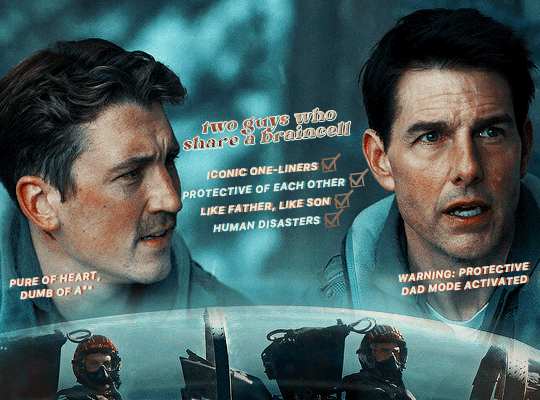



INTRODUCING THE TOP GUN: MAVERICK ENSEMBLE…
oh, what a family.
4K notes
·
View notes
Text
No but in all seriousness, memes aside, much love to all my friends in the UK right now. I know shit's about to be chaotic and nationalistic and shitty, and I hope the media circus ends as quickly as possible.
99K notes
·
View notes
Text
I am laughing at all the straight men who are confused by Paul Rudd being named sexiest man alive. My dudes, do not underestimate the sexiness of a sincerely loveable goofball.
13K notes
·
View notes
Text
While indulging in Law and Order fanfic I came across this little meta gem that broke the fourth wall. I could relate to the characters. I was as upset as they were when I found out they were cancelled.
0 notes
Text
My daughter told me the other day that my type is old ugly British men and I was pissed off at her assessment. Ugly by no means, but she may be right on the older British gentlemen part.
I just started watching Law and Order UK and I am smitten.





My Top Five Favorite Ben Daniels Characters (Meaningful): 1. James Steel - Law & Order: UK (2009 to 2010).
29 notes
·
View notes
Text
Malevolent Spirits
Summary: Sylvia has two problems. One is a ghost in her house. The other is her husband. (Tw: domestic abuse, violence)
Morgan is not a malevolent spirit.
Her visitors treat her like one. They crawl through her rotting house with cameras clasped in sweaty hands, hissing about evil and violence. They bring out objects of prayer to ward her off. Some of them try to trick her into speaking. Into acting. They spend hours recording the whispering of the wind through the cracks in the attic or the creaking of her home sinking into a century old foundation.
Morgan watches them from the slanted chandelier in the foyer and never says a word.
Truthfully, she doesn’t hate them. They’re alive and addicted to the strange cocktail of hormones the body produces when afraid. She can’t hate what is created by nature.
Perhaps that’s why she isn’t a malevolent spirit. She knows addiction and to be alive is to be an addict. Food, water, passion, lust, greed, love, fear. A complex array of cocktails all pumped directly into your receptive brain. The bad ghosts are jealous of it. Greedy for it. And Morgan simply…isn’t.
She has her routines. She stays well out of the way of the people who come to explore her abandoned and withering house. When those who need the shelter of her walls find themselves there late at night, she makes sure that the wind doesn’t blow the doors open, that they choose the rooms with the best windows, that the pests that have started to nest in the roofline don’t wander down.
On days she has no one, she stares out the window of the master bedroom - what used to be her bedroom - into the garden. Her neighbor’s houses shrink and expand, fall apart, get torn down, and then reemerge like new, brightly colored with gleaming windows, but her garden stays the same. The weeds bloom into late spring, pops of white false morning glory all along her wrought iron fence, and wither into long, thin stalks in the winter. The squirrels she once chastised for eating her tomatoes lay down to rest and their descendents descend on the new vegetable patches in the neighborhood.
Then, one day, a man in a white van pulls up. He cracks open the back door and pulls out a long orange banner. This he strings along her fence with precision, pinning it so that it lays flat. He examines his work, nods, pulls out his phone to snap a picture, and then he’s on his way.
When Morgan goes to investigate, she finds the words UNDER DEVELOPMENT emblazoned on the banner.
Thoughtfully, she returns to her window.
—————-.
Keep reading
3K notes
·
View notes
Text
Because I love diverse characters and representation in the media I consume I'm adding these to my reading list. Right now I'm reading T J Klune's Under the Whispering Door upon the recommendation of my sister and I have all the feels.
THE B-LIST: FEEL THE LOVE WITH THESE SWOON-WORTHY LGBTQ ROMANCES
Sure, Valentine’s Day has already come and gone. But love can still be in the air while we enjoy our heavily-discounted candies.
I’m a relative latecomer to the romance genre; I spent my teens and early twenties reading Anne McCaffrey and Stephen King, and used to consider romance something grandmothers read. The airbrushed covers and trope-laden stories were there to snicker over and mock, not truly enjoy.
But as things in the wider world have gotten grimmer, I’ve found myself turning to romances and their guaranteed Happily Ever After (or HEA) plots for solace and escape. When dirty politics and environmental catastrophes and a crashing economy keeps me up at night, romances and their familiar tropes are there to make things feel a little better for a while. (Hence why I’m now writing romances, too, like my LGBTQ fantasy/Western series, “Hazeldine”.)
The genre is not without its flaws, of course — there are still some pretty nasty issues with racism, body shaming, consent problems and internalized misogyny in the industry — but these days, Romance with a capital R has become much more inclusive and diverse.
Writers of color and queer authors are getting mainstream publishing deals, and telling stories beyond the basic white-boy-meets-white-girl formula. People who have long wished to see themselves in the stories they enjoy are finally having that dream come true, and that’s a beautiful thing.
This week, I’m recommending a few of my favorite LGBTQ authors/stories that are guaranteed to give you warm-fuzzies and make even the most sour of singles believe, if just for a couple hundred pages, that true love may be real.

1. Cat Sebastian
Sebastian has held a place of honor at the top of my Favorite Authors list for several years now, and she has yet to disappoint me even once. She writes historical trilogies, most set in England, and every story features queer characters. Even her “Regency Imposters” series, which outwardly seem to be traditional male/female romances, star nonbinary, bisexual and pansexual leads.
Another thing I adore about Sebastian is that she writes about characters with disabilities and who are neuroatypical. Her heroes deal with anxiety disorders and post-traumatic stress and still find love and acceptance! Sebastian’s stories are also big on the found family trope, the idea that the family you choose for yourself can be just as if not more important than any family you’re born into.
And while queerphobia and societal disapproval often factor into her stories, those issues aren’t the only problems the characters face. It’s so nice to find a queer story — and a historical one, no less! — that’s about more than just hiding a forbidden love or escaping persecution.

2. Casey McQuiston
When McQuiston’s first book, “Red, White & Royal Blue” came out in 2019, it was beautiful wish-fulfillment for everyone feeling beaten down by the current political climate. Imagine a world where there was a lady President, whose biracial and bisexual son fell in love with the Crown Prince of England, and her first response was to put together a PowerPoint advising her son to stay safe and happy? Downright dreamy!
McQuiston — who is nonbinary and bisexual themself — delivered gold a second time last year with “One Last Stop”, a time-traveling subway-set romance between August, a cynical young woman from today, and Jane, a punk lesbian from the 70s. McQuiston has such a knack for creating colorful characters who transcend stereotypes and feel real and entertaining.

3. TJ Klune
As an asexual (ace) writer myself, I really admire Klune as both an ace/queer advocate and an author who mixes fantasy and romance in his work. His biggest hit to date is “The House by the Cerulean Sea”, which has won a slew of awards and is still a best-seller two years after its release. Like Sebastian, Klune’s characters cover an array of LGBTQ identities and neurodiversities, and have a strong emphasis on found families.

4. The “Simon Snow” trilogy by Rainbow Rowell
Since J.K Rowling was revealed to be a truly nasty TERF (trans-exclusionary radical feminist), I’ve found it impossible to love/enjoy Harry Potter as I used to. Thank goodness Rowell is around to fill the hole left behind — her fantasy trilogy of “Carry On”, “Wayward Son” and “Any Way the Wind Blows” nicely answers the question “What if Hogwarts hadn’t been created by a TERF?”
The Snow trilogy is a fun blend of paranormal romance and that boarding school fantasy/epic adventure made so popular by Potter, but with a far more diverse cast, where Rick Astley-loving hero Simon Snow attends the Watford School of Magicks and finds himself falling for his grumpy vampire roommate, Baz.

5. “Iron Widow” by Xiran Jay Zhao
If you took “Pacific Rim”, “Dragonball Z” and Chinese mythology, swirled it all together, and centered it around a polyamorous triad you’d end up with “Iron Widow”, wherein the titular heroine uses qi (energy) to power giant Chrysalises alongside her co-pilot boyfriends to fight alien bugs in a fantastical medieval China setting.
Even before “Iron Widow” was released, Zhao (who is nonbinary) had amassed quite a following with their hilarious YouTube videos (which I highly recommend seeking out, especially their defense of American Chinese food). They’re one of the most entertaining vloggers out there, and “Widow” is a brilliant piece of queer fantasy that’s full of razor-sharp commentary about misogyny and oppression.

6. Olivia Waite
If you love Cat Sebastian, but want to see more lesbians in your historical fiction, Waite is your gal. Her “Feminine Pursuits” series — which so far includes “The Lady’s Guide to Celestial Mechanics”, “The Care and Feeding of Waspish Widows” and “The Hellion’s Waltz” — are all great period-set romances starring powerhouse heroines. Waite is also the romance columnist for the New York Times Book Review, which makes her a great source for quality recommendations.

7. Jordan L. Hawk
I’ve sung Hawk’s praises in a previous column, but I can’t talk about queer romance without dropping his name again. His “Whyborne & Griffin” and “Rath & Rune” series are equal parts sizzling romance and dark Lovecraftian fantasy, full of horrific monstrosities and passionate declarations — I just know Lovecraft himself would be spinning in his grave over these stories, which makes them even more enjoyable. And with so much of the romance genre, even the queer portion of the genre, dominated by cis women, it’s nice to hear a trans man’s voice for a change.

8. “Check, Please!” by Ngozi Ukazu
If you’re more interested in a romance that’s heavy on the feels and light on the bedroom scenes, something that’s even teen appropriate and heart-warmingly wholesome, look no further than this charming comic, now collected into two print volumes.
The story follows junior figure skater and enthusiastic baker Eric “Bitty” Bittle as he joins his college hockey team, falls in love with said team’s captain and navigates his four years of college as a young gay man. “Check, Please!” is a story that I go back to every time I want to be overwhelmed with emotions; it makes me laugh and cry and then happy-cry every time. This is a will-grow-your-heart-three-times-bigger story with lovely characters, goofy comedy and sincere messages — and it has a completely uplifting ending. Just the thing to brighten a gloomy February day.
(This column originally ran in The Times.)
529 notes
·
View notes
